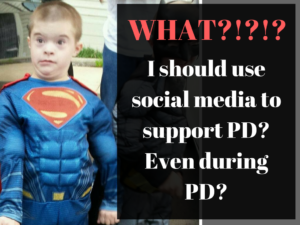 I have a pet peeve when it comes to delivering professional development (PD) and participants use their laptops or mobile devices…oh…and it isn’t what you think!
I have a pet peeve when it comes to delivering professional development (PD) and participants use their laptops or mobile devices…oh…and it isn’t what you think!
My pet peeve is when hosts or others require participants to unplug and NOT access their mobile devices during PD.
I understand the thinking behind the “rule.” For example, they want participants to show respect to the speaker, they want participants to be fully present, and they want to minimize multi-tasking, which we know leads to doing several things poorly instead of one thing well.
So, why is it that I’m a proponent of allowing participants to be on their laptops or mobile devices when I’m presenting?
Here’s my logic:
- If I’m being relevant, then emails, Facebook pictures of grand kids, or the latest “pins” aren’t really competition.
- Many people are so habituated to multi-tasking that to ask them to stop is more of a distraction to their internal state and ability to attend, than surfing while I’m talking.
- I appreciate and want participants to share ideas or quotes with others in their social networks.
The #1 reason people share via social media is because they feel the information is relevant to others.
For me…it becomes my responsibility to harness the power of social media, versus trying to control the behaviors of adult learners.
This means, I need to learn how to use social media, AND deliver content that is worthy of being shared.
As I continue with this month’s stand, that PD providers need access to meaningful PD, I’ll share a few ideas for using Facebook, Pinterest, and Twitter during both preservice and inservice PD.
The overall goals are to use social media before, during, and after the delivery of content to:
- Help foster a sense of community among participants
- Sustain interest and motivation that will lead to action
- Share relevant information on an as-needed basis
FACEBOOK (building community)
My suggestion is to create private Facebook groups for supporting a variety of preservice and/or inservice PD situations. For example, when….
- Cohorts of students need to share tips for successful matriculation through a training program.
- Students are required to work on a projects that requires they work as a team and share resources.
- Faculty need a simplified version of a course management system for students to engage in online discussions.
- Leaders want to form a variation of communities of practice or mastermind groups.
- Trainers want to stay connected during a PD series or in between site visits and coaching sessions.
PINTEREST (sharing visually)
My suggestion is to create your own boards that can be shared with participants and/or to help preservice and inservice participants create boards.
The #1 thing shared via social media = pictures
PD provider board ideas:
- Offer strategies for other PD providers to try
- Connect readers to your blog that likely contains useful tips and resources
- Direct others to important publications
Preservice board ideas:
- Career exploration opportunities where they collect things they are passionate about
- Job searching opportunities by creating a portfolio board
- Service boards where they share information with families
Inservice board ideas:
- Do it yourself (DIY) PD learning opportunities
- Inspirational quotes to support social-emotional health and well-being
- Tips and ideas from others who are working in the field
TWITTER (keeping current)
My suggestion is to use Twitter to keep yourself up to date with educational events, as well as, participate in advocacy work.
PD providers can also use Twitter to facilitate online discussions, which are called Twitter chats or Tweet chats. Click here to learn more about how to set up a Twitter chat, and here to learn how to participate.
If you are new to Twitter, you may want to check out this resource on what all the abbreviations mean and how to use hashtags to organize content.
Author note: Many thanks to my friend and colleague Dr. Margarita Mooney (@margaritamooney) from Princeton University, who helped me with the concepts and content in today’s post. Margarita routinely writes and speaks on the topic of “Branding Your Scholarly Passion on Social Media.”